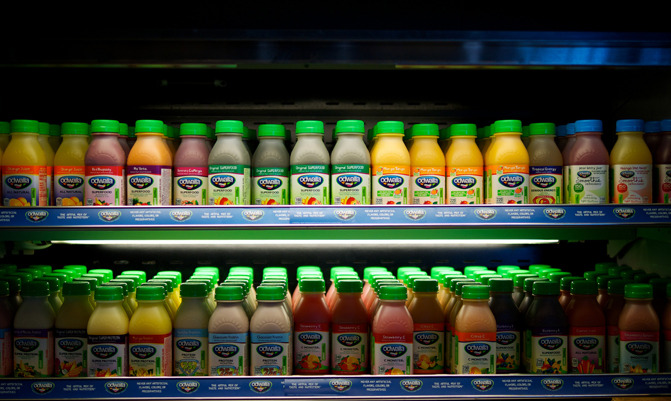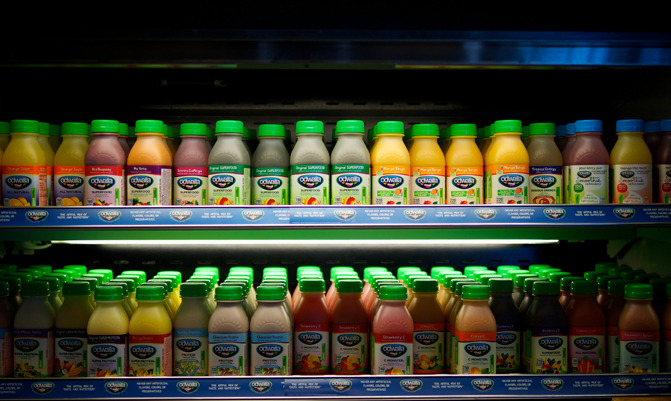Did You Know That These 10 Small Food Companies Had Been Gobbled Up By Big Business?
Did You Know That These 10 Small Food Companies Had Been Gobbled Up by Big Business?
The past decade or so has seen a boom in small food companies with a natural or healthy slant taking market share away from the big guys (especially in the past few years as consumer trust in the famous names erodes), which most people can agree is a good thing. But all is not as it seems: Many of those seemingly small companies are owned by some of the largest food corporations on earth.
Kashi: Kellogg’s
Kashi, founded in 1984 in La Jolla, California, focuses on breakfast cereals and other products with lots of whole grains. In 2000, Kellogg's bought the company for $33 million, but allowed Kashi to continue to operate independently until March 2013, when Kashi headquarters were moved to Kellogg's corporate home in Battle Creek, Michigan. A year later, Kellogg's lost a class-action lawsuit and had to remove the term "All Natural" from its labels.
Krave Jerky: Hershey
Krave Jerky was founded by marathon runner Jon Sebastiani, of Sonoma's famed Sebastiani wine family, in 2009. The company, which produces artisanal jerky made with whole muscle in flavors like chili lime and cabernet rosemary, was purchased by Hershey earlier this year for somewhere in the $200 million to $300 million range. It represents the company's first foray into the $2.5-billion meat-snack market.
Annie’s: General Mills
Annie's Homegrown got its start selling natural macaroni and cheese to New England supermarkets in 1989, and founder Annie Withey took it public in 1995. The company went through several ownership changes over the years (and, confusingly, bought a separate company called Annie's Naturals in 2005), and was purchased by General Mills for $820 million in September 2014.
Applegate Farms: Hormel
Founded by Stephen McDonnell and Christopher Ely in 1987, Applegate sells natural and organic sliced deli meats, sausage, cheese, and bacon that are free of antibiotics and additives. The company's future was in doubt after McDonnell suffered a stroke in 2013, but Hormel purchased the company earlier this year for $775 million, allowing Applegate to operate independently and keep its headquarters and staff.
Cascadian Farm: General Mills
In 1999, General Mills purchased Small Planet, which owned Cascadian Farm (known for organic cereals, granola bars, and frozen fruits and vegetables) and Muir Glen (which produces organic canned tomatoes) for an undisclosed sum. There was some controversy in 2009, when eagle-eyed consumers noticed that the amount of sugar in Cascadian Farm's Purely O's had tripled, but after an uproar, the company lowered the sugar content from three grams back down to one.
Boca Foods: Kraft
Boca Foods is best known as the producer of the Boca Burger, a soy-based meat-free burger in varieties including Bruschetta Tomato Basil Parmesan, Savory Mushroom Mozzarella, and Chile Relleno. It was founded in 1993 by Max Shondor, and sold to Chicago investors in 1997. In 2000, the company was purchased by Kraft (which itself was owned by Philip Morris at the time). The following year, Kraft shut down Boca's original Fort Lauderdale factory, slashing 48 jobs, and moved operations to its own factories across the country.
Lightlife Foods: ConAgra
Lightlife Foods, a pioneer in plant-based protein since 1979, is today best known for its "Smart" products, like Smart Bacon, Smart Deli, and Smart Sausages. In 2000, it was purchased for an undisclosed sum by packaged food giant ConAgra Foods, who ironically two years later lobbied to stop Oregon's Measure 27, an initiative that would have mandated labeling products that contain GMOs.
Odwalla: Coca-Cola
The early 2000s were the height of the smoothie craze, and Coca-Cola jumped into the pool by buying Odwalla, the juice and smoothie company founded in 1980 in Santa Cruz, California, for $181 million. It's still headquartered in California's Half Moon Bay.
Food Should Taste Good: General Mills
General Mills has been working hard to boost its healthy cred; on top of owning the aforementioned Cascadian Farm and Muir Glen, they also own energy bar company Larabar as well as Food Should Taste Good, the popular Massachusetts-based snack company launched in 2006 with wholesome ingredients and a unique design. General Mills purchased the company six years after its launch, in 2012, for an undisclosed sum.
Naked Juice: Pepsi
Where Coke goes, Pepsi soon follows, and as part of a major initiative to buy up health-focused companies, Pepsi bought Naked Juice for an undisclosed sum in 2006 (the same year it also bought Stacy's Pita Chips and Izze Beverages). The company, which was founded in Santa Monica in 1983, continued to operate from its Azusa, California, headquarters until being moved to Monrovia, California, in 2010.











